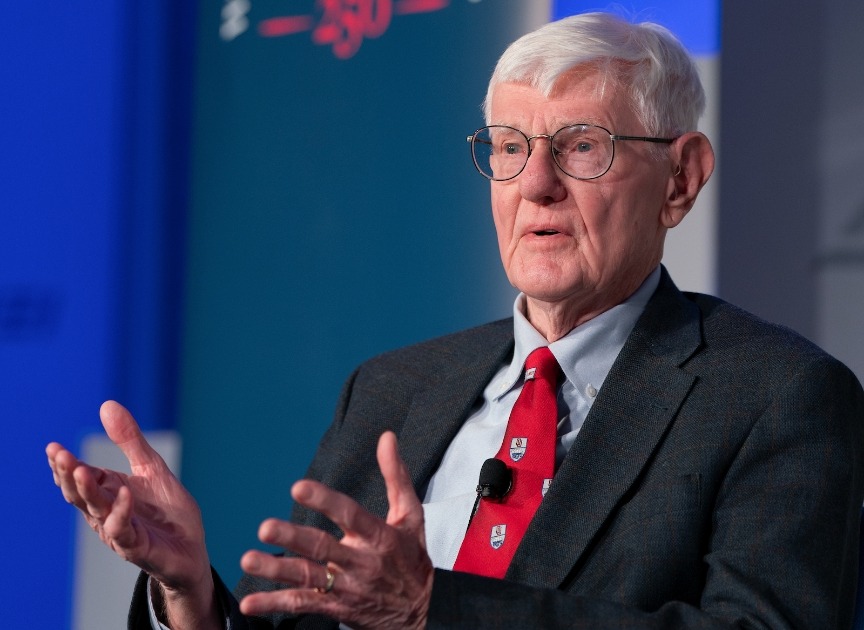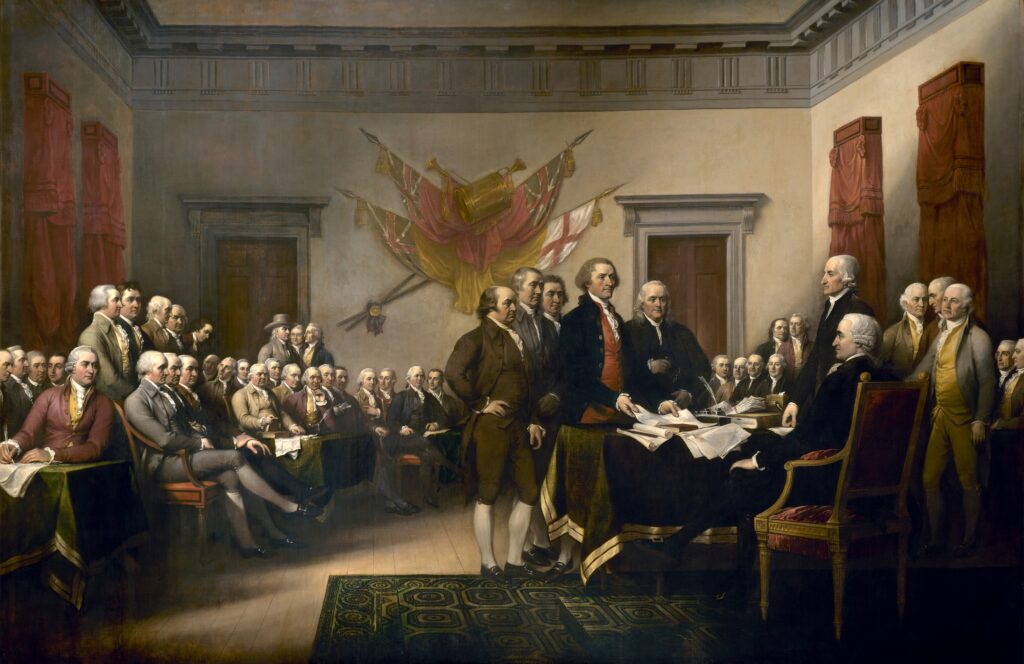
July 4, 2026, will mark the 250th anniversary of the Declaration of Independence and, therefore, of the United States of America. That we can point to such a distinct starting point marks us as a modern nation, perhaps the first modern nation: No countries older than the United States, but almost all countries younger, can claim to know in this way exactly when they were born.
The Declaration itself insists it does not mark the beginning of the American people as a distinct society, but only one of those moments when
it becomes necessary for one people to dissolve the political bands which have connected them with another, and to assume among the powers of the earth, the separate and equal station to which the Laws of Nature and of Nature’s God entitle them.
But this was a strategic understatement, to put it mildly. There had never really been any such moment before, and there is no prior example of a people declaring to the world its reasons for becoming a newly independent nation. The American Revolution was essentially the first successful colonial revolt in the known history of humanity. And the colonists chose to announce their rebellion by declaring a set of universal truths about humanity and then rooting their new nation in those bold assertions. It was an even bigger moment than the Declaration claimed.
That we can mark the anniversary of such a moment offers us an opportunity for gratitude and celebration. The authors of the Declaration of Independence, and the people whom they led and represented, would surely have been surprised that their achievement has lasted for two and a half centuries—and that the nation they launched has become the most prosperous and dynamic society in history. We should be thankful to be the beneficiaries of their sacrifices and to have the chance to build on what they left us.
But to do that well, we should also treat this anniversary as an opportunity for reflection and thought. We should consider just what it was that began 250 years ago—what the American Revolution involved and achieved, what the nation it created meant at its origin, what it has come to mean since, and what it may mean in the future. This book, and the series of which it is a part, aims to reflect on precisely those questions.
That may sound like a strangely intellectual way to celebrate a birthday, but it is actually a distinctly and familiarly American form of patriotism. This country has always offered its people fodder for serious thought, and Americans have always looked on our country as both the home we love because it is ours and a kind of sociopolitical achievement that must be measured against its ideals. That our nation’s 250th birthday will be a time for asking whether we are living up to those ideals is only natural.
But this book is also a distinctly intellectual form of celebration because it is the work of a community of scholars. The American Enterprise Institute is a venue for reflection—both theoretical and practical—on how the United States could best live up to its promise and how its people could be more happy, virtuous, free, and safe. We know that the nation’s semiquincentennial will be marked by different individuals and groups in different ways, but in thinking about what our particular contribution might be, it seemed perfectly obvious that it would need to be an enduring intellectual product.
This has been the impetus behind AEI’s “We Hold These Truths: America at 250” initiative. Over several years leading up to the anniversary, we are inviting scholars both within AEI and from other institutions to take up a series of themes important to understanding the American Revolution. These scholars represent various fields and viewpoints, so they will approach each of these themes from various angles that could allow their work in combination to offer a broad field of vision on the questions they address. The papers they produce will be published in a series of edited volumes intended to help Americans think more deeply and clearly about our nation’s origins, character, and prospects.
Democracy and the American Revolution is the first of those books. Its chapters began as papers presented at an AEI conference held in Washington, DC, on November 15, 2023. Further volumes will consider the American Revolution in relation to other themes, such as religion, natural rights, the legacy of slavery, and the Constitution.

Democracy is our first theme because its connection to the American founding, while essential, is more complicated than it might first seem. The American revolutionaries launched their rebellion against Britain at least in some part as the result of what they took to be a democratic deficit: They objected to being taxed without being represented in Parliament. But the Declaration of Independence does not present itself as founding a democracy. Rather, it asserts indifference to particular forms of government, insisting that a people finding themselves misgoverned have the right “to institute new Government, laying its foundation on such principles and organizing its powers in such form, as to them shall seem most likely to effect their Safety and Happiness.”
But here, too, the Declaration seems to engage in a kind of calculated understatement. The insistence that a legitimate government must secure the rights of its people and facilitate their safety and happiness places rather strict constraints on the range of forms it could plausibly take. And the particular complaints lodged against the British king sketch out by implication some of the boundaries of that range. We are told, for instance, that the king “has dissolved Representative Houses repeatedly, for opposing with manly firmness his invasions on the rights of the people,” and that he “has refused for a long time, after such dissolutions, to cause others to be elected; whereby the Legislative powers, incapable of Annihilation, have returned to the People at large for their exercise.” If these are reasons to rebel against the king, they certainly suggest a broadly democratic conception of the character of political legitimacy.
If we take democracy, as we should, to describe more than a formal system of government, it emerges that much more prominently in the drama of the American Revolution. If it is, as Alexis de Tocqueville suggested, more of a “social state,” then surely we would have to say that the spirit of democracy was prominent among both the causes and effects of the American Revolution—indeed that, in a sense, it is what that revolution unleashed upon the world. Democracy is, in that respect, the natural first theme to take up in considering our founding’s legacy.
In the chapters that follow, five eminent scholars of history and political thought explore how we ought to understand democracy and its connection to the American Revolution.
Gordon S. Wood considers the varied meanings of democracy and the range of ways they shaped the actions, ideas, and self-understandings of the American people in the era of the Revolution. He suggests that we should think about that era not as a single moment but as a period of gradual development in which a set of democratic concepts and a set of American practices and institutions shaped each other.
Bryan Garsten then explores the nature of the revolutionary spirit itself—that spark of independence that moved the founding generation to act boldly and has reappeared at key moments in our history. He argues that understanding that spirit as a kind of episodic passion is crucial to grasping the deepest meaning of the Declaration of Independence for our time.
Peter Berkowitz considers some of the ways we have misunderstood the Declaration, and he proposes to correct those by drawing on a set of both classical and modern political ideas. These, he believes, can help us better comprehend the nature of modern liberal democracy and the central place of the American founding in defining it.
Danielle Allen digs further into the Declaration itself and illuminates John Adams’s underappreciated role as its coauthor, alongside Thomas Jefferson. She argues that, by better appreciating the part that Adams played in conceiving and articulating some of the Declaration’s key concepts, especially the idea of the pursuit of happiness, we could more fully understand the ways that document sowed the seeds of the democratic age we inhabit.
And finally, Greg Weiner argues that the Declaration of Independence should be understood as a thoroughly democratic document. Drawing on Abraham Lincoln, he writes that the Declaration is an argument intended to persuade a majority to act together in defense of the fundamental rights of all human beings. It is therefore rooted in a conception of politics oriented to both pursuing the common good of society and securing the core natural rights of individuals, and it suggests that the two need not be contradictory.
The breadth of the arguments advanced in these chapters offers a sense of how broad the meaning of democracy might be. And their depth can help us see how profound an event the American founding was—and how important are the continuing stakes of the American experiment.
On this momentous anniversary, we are compelled to ask ourselves what kind of nation was brought into the world 250 years ago. “A democratic nation” certainly offers a strong opening attempt at an answer. Like this book, that answer must be understood as only one crucial part of a larger whole—but one that comes first with good reason.


